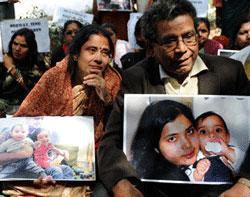
New Delhi, April 24: NRI kids Abhigyan (3) and Aishwarya (1) Bhattacharya on Tuesday finally return to their family in India after a Norwegian court ruled that their custody should be handed over to their uncle.
The flight carrying the NRI kids landed at the New Delhi airport on Tuesday morning.
This brings to an end a family tragedy that grabbed headlines in India, disrupted ties between New Delhi and Oslo, and even required an intervention by the PM with his Norwegian counterpart.
As soon as the court gave its ruling, the MEA swung into action.
Led by Balachandran from the Indian embassy in Norway and other senior officials, the children, their Norwegian foster parents and their uncle were whisked out of Oslo on a commercial flight to India.
The parents of the children, though, continue to remain in Norway. Anurup Bhattacharya, the father of the kids, said, "I was greatly relieved after hearing the verdict. It had been a major fight for the last one year. It changed our life completely.Even the life of our children had been affected. They have forgotten their mother tongue. I am happy they are returning home."





Comments
Add new comment